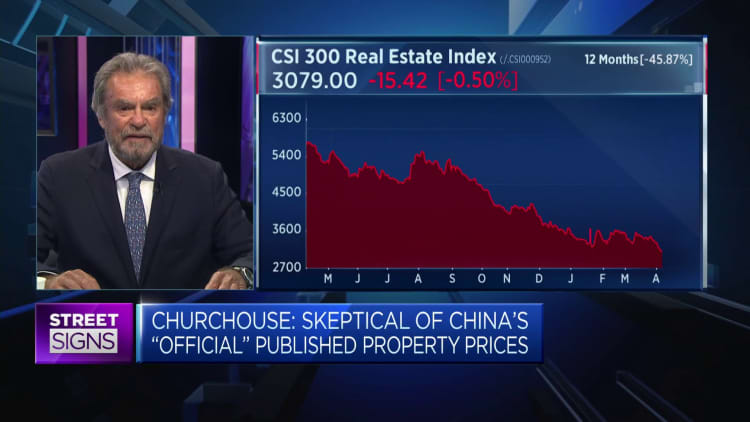Pictured here is a real estate project under construction in Huai'an City, Jiangsu Province, China, on April 8, 2024.
Future Publishing | Future Publishing | Getty Images
BEIJING — China needs to convince people that home prices are on the way up for economic activity to rebound, Richard Kuo, chief economist at Nomura Research Institute, told CNBC's Steve Sedgwick last week.
Business and consumer appetite for new loans saw a tepid start to the year, while home prices fell at a steeper pace in January than in February, according to a Goldman Sachs analysis.
In other words, as Kuo warned last year, China may be entering a phase of “balance sheet recession,” similar to what Japan experienced during its economic recession.
“For them to come back and borrow money, we need a narrative that says, ‘OK, this is the bottom of prices, and prices will start to rise from this point on,’” Koo said.
But it is not clear whether prices have reached an actual bottom yet. Kuo and other analysts noted that house prices in China's policy-driven economy have not fallen as much as expected given declines in other aspects of the real estate market.
Chinese officials said real estate is still in an “adjustment” period. The country is also focusing on new growth engines such as manufacturing and new energy vehicles.
Real estate and related sectors account for at least a fifth of China's economy, depending on analysts' estimates. The property market began its latest decline after Beijing cracked down on developers' heavy reliance on debt in 2020.
This coincided with the shock caused by the Covid-19 pandemic.
It also comes at a time when China's population is starting to shrink, a big difference with Japan, whose population didn't start to decline until 2009, Kuo noted.
“This makes the narrative that prices have fallen enough, and you should go out and borrow and buy homes, that much more difficult to justify because the population is shrinking now,” Koo said.
Lessons from history
China's economy officially grew by 5.2% in 2023, the first year since Covid-19 controls ended. Beijing has set a growth target of about 5% by 2024.
However, many analysts said such a target is ambitious without further stimulus.
Chinese authorities have been reluctant to embark on large-scale support for the economy. The reason behind this is that Beijing views the previous stimulus program as a mistake, Kuo said.
About 15 years ago, in the wake of the global financial crisis, China launched a 4 trillion yuan ($563.38 billion) stimulus package that was initially met with skepticism — and a 70% decline in Chinese stock prices, Kuo said.
“It was heading toward almost a balance sheet recession,” he said. After one year, China achieved growth of 12%.”


Kuo said Beijing continued its stimulus package even after the country achieved rapid growth, leading to increased growth and speculation, as well as corruption. “This is one of the reasons why this government, Mr. Xi Jinping, is still reluctant to put forward a large package because many people believe that the previous package was a failure,” he added.
Looking ahead, Kuo said China must stimulate its economy to avoid a balance sheet recession, and must reduce such support once growth reaches 12%. “Once borrowing comes back, you can cut back, but not before.”
